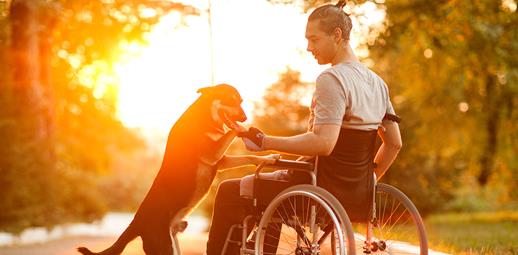
If you get a puppy, it won’t take you long to realise they love rolling around in puddles, sniffing everything and playing with other dogs. To protect them as they explore their exciting surroundings, having them vaccinated should be one of your first considerations.
As well as the initial series of vaccinations that all puppies need when they’re very young, dogs also need regular boosters throughout their lives to help keep them safe and healthy.
Here are the answers to some questions about getting dogs vaccinated.
Why do dogs need vaccinating?
Vaccinations protect dogs from diseases that are a high risk to them and can be deadly. Getting your dog vaccinated will also prevent it from passing diseases to other animals, including other pets you might have.
Up to date vaccines are likely to be a requirement if you want to insure your dog, leave it at a kennel or hotel while you’re away, or take it abroad with you.
How often will my dog need vaccinating?
Puppies normally need to start vaccinations between the ages of six and nine weeks. Before that time, the Blue Cross says the immunity passed onto them through their mother’s milk normally protects them from most infections.
Puppies need several initial injections. Then, as they get older, they will need boosters, some on an annual basis and some up to three years apart. Each injection can contain several vaccines against different diseases.
I don’t know if my dog has been vaccinated. What should I do?
If you got your dog from a charity or animal shelter, then you may not be sure if they have had the right vaccinations and are up to date with their boosters.
In that case, the Blue Cross suggests it doesn’t hurt to repeat the course of vaccinations.
When in doubt, it’s always best to check with your vet first.
Which vaccinations does my dog need?
There are four main vaccinations needed for dogs, although your vet may recommend others.
Parvovirus
Also known as parvo, this is a highly contagious disease that is expensive to treat and can be deadly without treatment.
The disease is more prevalent in certain parts of the country than others, which can affect the advice you may receive from your vet on how often to vaccinate your dog.
Canine distemper
This contagious virus can be passed between dogs through their saliva, blood and urine.
There is no cure, but widespread vaccination in the UK mean that outbreaks are rare.
Leptospirosis
Also known as lepto, this life-threatening bacterial infection can also be passed on from dogs to humans, when it is known as Weil’s disease.
It can be spread through urine and contaminated water, putting your dog at risk if they swim or drink from stagnant water or canals.
Infectious canine hepatitis (ICH)
This viral disease is spread through the bodily fluids of infected dogs. The virus can survive for many months and can spread quickly.
Do I need to vaccinate my dog against rabies?
You may wonder about rabies vaccinations. But according to the Royal Veterinary College, these aren’t required in the UK and are only needed if you take your pet abroad; if you’re planning on taking your dog overseas, then they may need extra vaccinations just like people do.
It’s best to check with your vet before you go to make sure your dog has the right vaccinations and all the paperwork they need before you travel.
How much do vaccinations cost?
It’s difficult to say how much it will all cost as the costs of keeping your dog vaccinated vary, depending on what vaccines they need and when.
According to Blue Cross, a puppy’s initial set of vaccines will cost between £30 and £60, while regular booster vaccines will cost less.
This may seem expensive, but it is far cheaper than treating the diseases themselves, and could save a lot of stress and pain.
Will there be any side effects?
Vaccinations can sometimes cause side effects in your dog. But, according to vet charity the PDSA, these are rare, usually mild and pass within a few days. The important thing is to contact your vet if your pet suffers side effects after a vaccination or is otherwise unwell.


